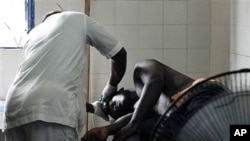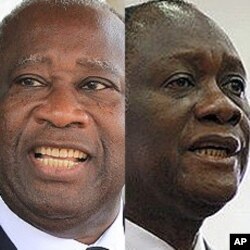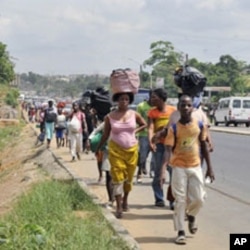Residents in Ivory Coast's commercial capital, Abidjan, say fighting between supporters of the country's two rival presidents has left at least four dead. Witnesses say a group of armed men opened fire on security forces at a road block Tuesday in a middle-class neighborhood of the city.
It is not clear if the dead were supporters of incumbent president Laurent Gbagbo or rival president Alassane Ouattara. Residents say Gbagbo supporters have set up roadblocks all over town.
Gbagbo has refused to cede power to Ouattara, who is recognized by the United Nations and the African Union as the winner of November’s presidential election.
On Monday, the fighting in Abidjan spread to a pro-Gbagbo neighborhood called Yopougon for the first time since the political crisis began.
The fighting in Abidjan had previously taken place primarily in Ouattara strongholds.
Peter Clottey's report from the northeastern neighborhood of Cocody
Just this evening, the taxi I was in was stopped and searched, my luggage was searched. I had to show my ID to the military, who asked me what I was doing in the country, where I was coming from and where I was going. I was made to understand this is an effort by the Gbagbo government to prevent the rebels from coming in and causing havoc.
Citizens have dubbed the insurgents “invisible commandos,” who often operate at night. Clottey says they also mix in easily with the population, making it all the more difficult for the military to tell them apart from ordinary civilians.
As a result, night life has ground to a halt, even without a formal curfew.
You [don’t] see people at 7 p.m. moving from place to place enjoying the night life. Because of the crisis, [going out] has been brought down to the barest minimum. Most bars are closed by 9:30 p.m.
Two days ago, the neighborhood of my hotel was attacked and rebels were shot at by the military. Though there were no reported deaths, it drew the attention of most people in the area.
Many people say they are in favor of some sort of compromise between Gbagbo and Ouattara so life can return to normal.
What I’ve heard, is that the two leaders should hold a face to face dialogue to resolve the issue. Most people I spoke to say the two leaders should not hold the country as ransom, and they were saddened that EU measures blocking trade have been put on the country when, they say, other measures could be taken.
Some pharmacies fear the EU measures will prevent them from re-stocking medicines, including those for treating malaria and HIV/AIDS.
Others say it is unfortunate the international community seems not to know what to do about the crisis, and some accuse the Economic Community of West African States (ECOWAS) and the African Union of failing to appreciate what ordinary Ivorians are going through at the moment.
On Friday, the AU reaffirmed Ouattara as the legal president of Ivory Coast. ECOWAS backs the imposition of sanctions against Ivory Coast, and has suspended it from all of the regional organization’s decision-making bodies.






